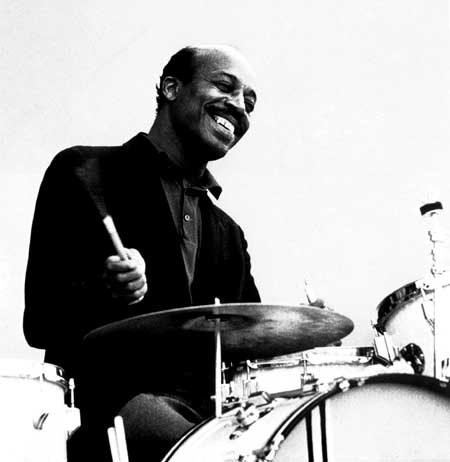Drumming hasn't gotten better
One of the biggest misconceptions about drumming that I had as a young student of the instrument, was that the art of drumming has gone through a historical progression. That is to say that over time drummers have elevated the craft of drumming, so that what people are playing today is infinitely more sophisticated and better than the great drummers of the past. After all, I thought, back then drummers didn't even have double bass pedals, so how could they play anything like this?
Evolution doesn't mean improvement
 |
| This guy will cut you with brushes! |
In the world of drumming the exact same idea applies. Great drummers of the past mastered the musical niche of their time and place. While it is true that Papa Jo never played any ferocious double pedal drum solos, it also true that he could play circles (forgive the pun) with the brushes around just about anyone alive today.
The reason for this is simple, Papa Jo had to play brushes to survive and thrive in the musical environment he lived in. That in and of itself doesn't make Papa Jo a better or worse drummer than Thomas Lang, it just makes him different.
Birds VS Fish!
 |
| Birds 1, Fish 0 |
To further illustrate this point, think back to the birds and fish. Would we say that birds are better than fish or vice versa? Don't either of those statements sound absolutely ridiculous? Of course birds aren't better than fish, they are just different because they are adapted to completely different environments.
Bach VS Beethoven!
Perhaps a more relevant example than birds and fish is the evolution of classical music. If you compare the music of Beethoven and Bach you can easily hear how different their music is. Bach's music is generally intimate and exists within a relatively restricted compositional and theoretical structure. Beethoven's music is generally immense and exists within much broader musical structures. Bach's music is generally written for small scale performance or church. Beethoven's music on the other hand is written for massive symphony orchestras that featured many instruments that didn't even exist in Bach's day!
 |
| But who is the best? |
But nobody would ever say that Beethoven's music was better than Bach's, it would be foolish. Even the question of who is "better" seems ridiculous at this point. I am differentiating here between saying music is objectively better, and preferring one composer's music to the others. There are certainly many people who prefer Beethoven or Bach's music, but that isn't the point here.
Why it is important to study the great drummers of the past
Once you understand this point, that drumming hasn't gotten better but only changed, than the next step is to try to understand how drumming and music has changed over time to get to the point where it is now. Why do we play things the way we do now? Who were the major innovators along the way, and what did they contribute? What can we learn from great drummers of the past that may have been forgotten or neglected?
I haven't met or heard of a great drummer in my life so far who hasn't, to at least some degree, been a student of the history of the instrument for this exact reason. This doesn't mean that you have to spend all your time studying outdated styles of music, or learning to reproduce some historical drummers playing. Rather, this is all about getting perspective on the instrument. As Tony Williams put it,
"If you want to be expressive, you’ve got to find out what the instrument will do".

First off I'd take Gene Krupa in any musical situation, if I needed to blow people's minds in any genre. The other thing I'd say is, There is a technique envelop, and some techniques are gaining popularity or are more in vogue today. So those bag of tricks may actually be getting better even if the practisioners are not.
ReplyDeleteHey Nicholas,
DeleteThanks for the feedback. If you want there is an extended discussion of this exact topic over at the drummerworld forum that I started. Here is the link:
http://www.drummerworld.com/forums/showthread.php?t=91100